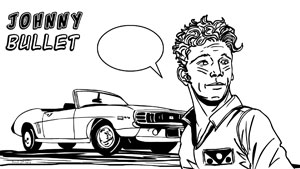|
|
|
|
But while there’s probably readers out there who could tell you how fast that Kryptonian babyrocket was traveling, or what type of gun ruined Bruce Wayne’s sanity, I don’t know that too many people know where those stories came from. Or rather, where the medium for those stories came from; comic readers love the history of their characters, but they tend to be a bit more hazy on history of the papery inky things those histories play out on.
(Maybe people think comics sprung, fully formed, right out Stan Lee’s head, ala Zeus. Or perhaps Alan Moore birthed them from a stone in a magic cave, I dunno.)
Will Eisner knows the original origin story, because he was there. He was there at the start of it, a Jewish son of New York who was good with a pen and saw the newborn field as something other than the fad that killed the pulps.
Eisner became the man who wrote (or rather, drew) the book on what comics could be back in their infancy, and there’s few better people around who could tell you that story in comic form. That’s The Dreamer, “A Graphic Novella Set During the Dawn of Comic Books”, just like it says on the cover.
And because it’s a comic, it’s less the story of those days, and more the history. It’s a little bit of memory, a little bit of allegory, sometimes it reads like summary, but it’s always a good story.
The names may have been changed to protect the innocent, the shady, and the dreamers, but you get the impression that Eisner couldn’t have made this stuff up; it’s just weird enough to be true (like Eisner being offered a job doing a line of Tijuana Bibles, unofficial sex comics starring celebrities and famous cartoon characters.)
Part of the fun of this book is seeing how Eisner remembers the artists that worked under him as part of his studio, a stable of talent that included such latter day sequential saints as Jack Kirby and Lou Fine.
Eisner even throws in a few moments showing that it’s not all great ideas, big dreams, and fat sacks of cash. Sometimes, it’s staying up until the wrong side of the morning to finish a story…then finding out the book has been canned. Or sometimes it’s being alone in the rain, too busy for a girlfriend and with nothing to do but to go back to work ‘cause the work is always there.
The point is: there are books out there if you want the “real” history; Eisner is telling you what it was like to be a young dreamer in a new creative field. This is where it all started, the spandex and the adventure and the fun and the drama; comics as art and comics as trash and comics as somewhere for people to say things.
(Bit of an end note here: if you do want the Real Story, I’d recommend a book called Will Eisner’s Shop Talk. It’s a series of interviews Eisner did with other comic creators, some of whom were around at the same time, and some of whom are actually in the book.)
© Copyright 2002-2020 by Toon Doctor Inc. - All rights Reserved. All other texts, images, characters and trademarks are copyright their respective owners. Use of material in this document (including reproduction, modification, distribution, electronic transmission or republication) without prior written permission is strictly prohibited.

